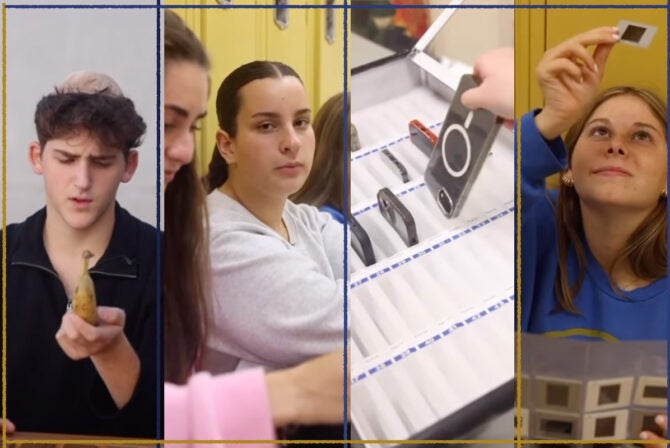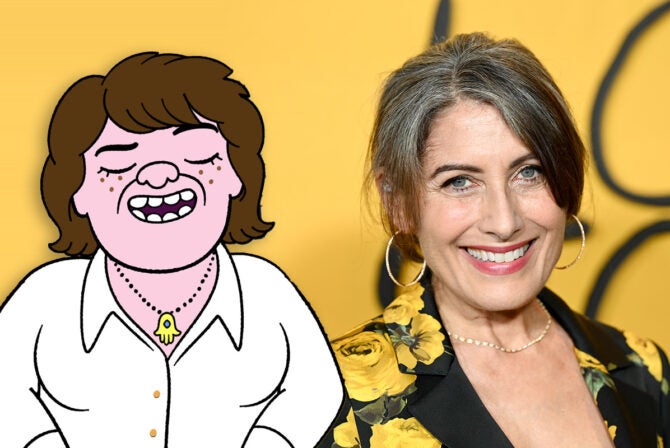There’s one really sweet Jewish line in the new Elizabeth Taylor documentary now streaming on Max, and it’s credited to Taylor’s third husband, Mike Todd, about their daughter Liza Todd.
“To Mike, she was a total miracle,” Taylor says in her own words in the recently unveiled recordings that comprise “Elizabeth Taylor: The Lost Tapes.” Her husband said of their daughter that she was “certainly going to be the first female president —and of course, the first Jewish president — of the United States.” Taylor is incredibly tender and effusive about Todd, the Jewish film producer behind “Around the World in 80 Days,” who died when his plane “The Lucky Liz,” named after his wife, crashed a little over a year into their marriage.
While Taylor herself was Jewish, aside from shots of her fourth husband, singer and actor Eddie Fisher, donning a kippah on their wedding day, there aren’t so many other explicitly Jewish moments in the film directed by Nanette Burstein, but there are certainly moments that feel Jewish. When reporter Richard Meryman, who recorded these interviews with Taylor in 1964 and 1965, the first year of her marriage to Richard Burton, asks her if she thinks she is going to hell for breaking up Burton’s marriage and her own with Fisher, Taylor, who had converted to Judaism half a decade prior, not for any man, she said, but out of deep affinity for the religion, rejects the concept of hell altogether: “I don’t think we can plan on being rewarded or being punished afterwards. I think we must pay on this earth and we should do our penance now.”
At the end of the film, we hear Elizabeth talk about her AIDS activism, which her agent Marion Rosenberg said she abandoned her film career to do. She talks about how she was driven to her activism after being filled with rage at the fact that despite gay men contributing so much to Hollywood — in fact, according to Taylor, there would be no Hollywood without them — no one was doing anything to help during the crisis that overwhelmingly affected them. It was then she told herself, like the great sage Hillel, “If I am not for myself, who will be for me? If I am only for myself, what am I? And if not now, when?” (In her own words, she summarized it: “Bitch, do something yourself.”) Taylor’s activism to help Americans suffering with AIDS was life-changing, truly exemplifying the Jewish value of tikkun olam, or repairing the world. In 2009, the world got to see how she did both her penance and changed the world when she had her former step-daughter Carrie Fisher present her with the GLAAD Vanguard Award (Fisher also wrote a TV film in which she shot a scene between her mother and Elizabeth Taylor).
The picture the documentary paints of Taylor is deeply human and charming. The film will not have much new to offer to fans of the Academy Award-winning actress except for how personal it gets, and how lovely it is to have her narrate the film in her own voice. It’s strange to think that she was just 32 years old when she was recorded in these tapes because of the breadth of experiences that it covers. It also touches on so many issues around celebrity culture that still feel pertinent today. There’s the creepy way Taylor went from quickly being a child star to a sex symbol, to the faults of celebrity tabloids and media creating a culture that decides to crown you or dethrone you at a moment’s notice. And then of course, there’s the relentlessness of the papparazi and the nosiness of fans, the way celebrities and their image live in our heads. When Meryman asks her if she longs to repair her image, so marred from her “breaking up” Eddie Fisher’s marriage, and then breaking up Burton’s marriage and her own to marry him in 1964, Taylor responds, “I gave up a long time ago… people already have a set image. They want to believe either the good or the bad and if you try to explain, then you lose yourself along the way.”
Yet perhaps what I loved most about this film is how Taylor, a woman who accomplished so much in her life on top of being a renowned actress — becoming a shrewd businesswoman and a relentless activist — was also constantly searching and finding herself anew. When she passed away in 2011, Carrie Fisher wanted her to be remembered for her vitality, saying that her father, who died that same year, had always loved Taylor, and that she was “this tremendous source of vitality.”
“Elizabeth Taylor: The Lost Tapes” paints the portrait of a funny, snarky and terribly honest and introspective woman behind some of the greatest Hollywood roles and films in its history, from “Who’s Afraid of Virginia Woolf” to “Cleopatra” to “Suddenly, Last Summer” and “Butterfield 8.” We get an intimate look at what the actress was feeling and going through as she shot many of these great films, and of the truth behind the big tabloid stories. We also get a glimpse of the kind of mother she was — very respectful of her children’s emotions and privacy. There’s something so magical about getting to spend almost two hour feeling like you’re in intimate conversation with Elizabeth Taylor, and the documentary is worth watching if only for that.








